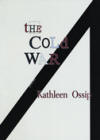The Cold War
In trying to locate an American identity, the politics of class infiltrate a collection seeking to amend the impossible with art. The Cold War, Kathleen Ossip’s second poetry collection, tackles the complex socio-economic class status conflicts that have been a staple of American culture for nearly the past century. Combining psychological and sociological documentation of the class phenomenon with past experience, in a relevant historical context, both challenges and informs the reader.
In trying to locate an American identity, the politics of class infiltrate a collection seeking to amend the impossible with art. The Cold War, Kathleen Ossip’s second poetry collection, tackles the complex socio-economic class status conflicts that have been a staple of American culture for nearly the past century. Combining psychological and sociological documentation of the class phenomenon with past experience, in a relevant historical context, both challenges and informs the reader.
Drawing from scholarly work on the idea of status and class that saturates the American mindset, Ossip translates complex scholarly jargon into compact, short poems. For example, the collection’s opening poem, “The Human Mind,” draws its title from a 1947 scholarly work by Karl Menninger. Ossip takes the difficult language of Menninger and crafts it into tercets that depict images of class envy, stacking them with each subsequent stanza. Ossip opens the poem with feelings of childhood, where:
In those days, we had an acceptance of others that didn’t rest
on their achievements. Melancholia, we cherished.
But how is the individual built? On the theories of the past.
These “theories of the past” continue to pervade the collection as anxiety over status escalates in “Status Seekers,” which draws from the Vance Packard 1959 book by the same name. Remembering her childhood, the speaker recalls a time when “Givenchy was going on, and we didn’t know it.” She thinks of the other families who stretched beyond their means, thinking that “We could not all be best, not in the smaller sense.” This same kind of yearning continues as Ossip addresses anxiety within art.
In taking to task an early critic of experimental American poetry, Yvor Winters, Ossip approaches the historical moment of Winters’s criticism and poetry while placing it in a larger context in “The Nervousness of Yvor Winters.” In long lines that appear structured as paragraphs, the poem chronicles the life of Winters as well as questions his own motive in criticizing and writing poetry. The speaker moves to her own definition of what poetry should be toward the end of the poem, claiming:
A poem without a present vulgarity has no legs. If a poem does not put off its reader to some degree, it is probably no more than a conglomeration of received ideas about beauty (or literary expression). Ideas withering even as we read them on the page.
The Cold War encapsulates this idea through its poetic examination of social pressures, reminding the reader that a poem does not need to be easy to be appreciated.





